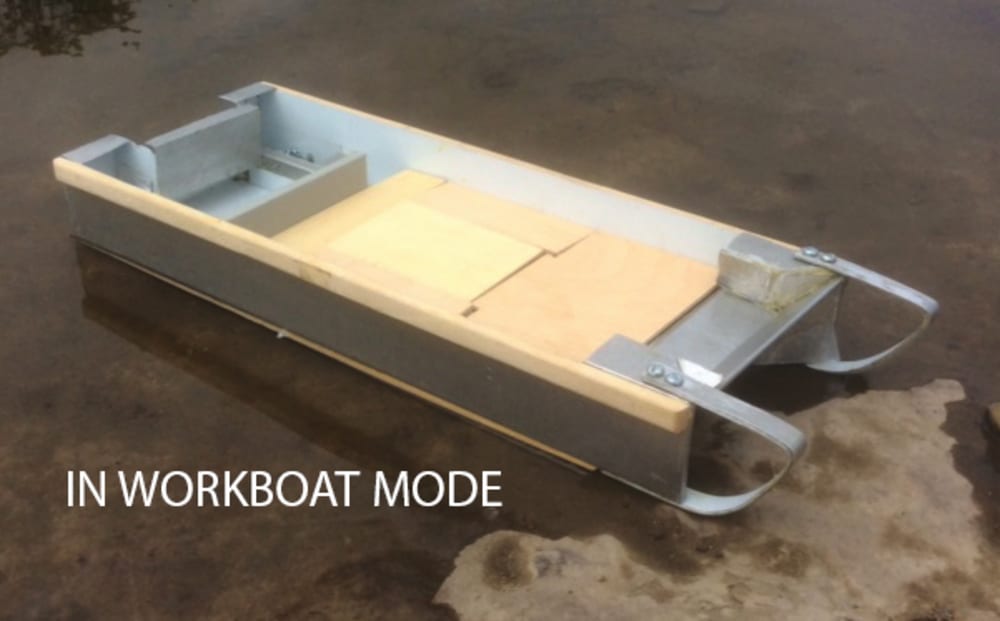There is a dire need to better protect the health of seashores, lakes and rivers, especially fishing grounds. A unique clean-up boat is described below. It aims to markedly reduce the cost and increase the effectiveness of meeting the need.
Though originally conceived by RESTCo, an Ottawa, Canada based R&D company, solely to recover spilled oil, it has morphed into a boat capable of filling multiple roles. It offers unprecedented economies through its standardized, simple features.
In its basic form and with a ramp it can serve as a general-purpose, beachable workboat. It becomes a clean-up vessel for oil, plastic or algae by adding special equipment, making it comparable to a basic vacuum cleaner with multiple, quickly changeable attachments.
The skimming function requires the boat to incorporate a mid-ship moon pool to accommodate a removable gravimetric oil/water separation tower. In workboat mode this pool is sealed closed. The pool has multiple other uses – for fishing, underwater search, research or diving.
For plastic or algae clean-up a conveyor, made from recycled plastic filter fabric, is used. This is a unique application of a widely used felt-like material used in oil-spill clean-up.
Effective oil-spill recovery demands fast response, unlike the usual practice today. This demands widespread, ready-to-go availability of the right equipment with local, trained crew, made up, for example, of fisherman and rapid-response personnel. Since oil clean-up is typically sporadic, having specialized equipment idle nearly all the time is expensive. This multi-purpose concept is an obvious answer to a high cost of protection.
Measuring only 23 ft by 8 1/2 ft the boat is readily trailerable and therefore rapidly movable to where and when it is most needed.
Larger, marine skimmers using the same oil-collection technology have been tested by third parties and proven to collect more than 90% of oil. This boat complements deep-sea skimmers, owing to its shallow-water capability.
The boat and its ancillary equipment only require capability that is widely available to manufacture any of the equipment.
Identifying priority markets for such a vessel requires an understanding of where existing capacity is inadequate, pollution is most prevalent, and its impact will be most beneficial. RESTCo has a good understanding of these markets through years of research and industry association. Marketing requires a recognition that these different aspects demand different strategies. Workboats are marketed via specialized distributors or direct sale from a boat builder. Recreation boats are primarily distributed via boat dealers. A major market for these boats will be remote communities dependent on maintaining healthy fishing grounds. Special consideration will be given to how best to serve their needs.
A boat so simple that it can be delivered at a competitive price point, and so versatile, offers incomparable value for money, a tangible benefit for a cleaner environment.
Models of our boat have been tested in RESTCo’s own test tank and its full-sized tower tested in our modified pontoon boat. Presently, arrangements are being made for our design to be refined by a naval architect.
Video
Like this entry?
-
About the Entrant
- Name:Peter Russell
- Type of entry:teamTeam members:Peter Russell
Bill Adams
Chris Ives
Wes Gerrish
Darryl McMahon - Patent status:none








